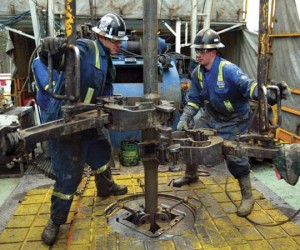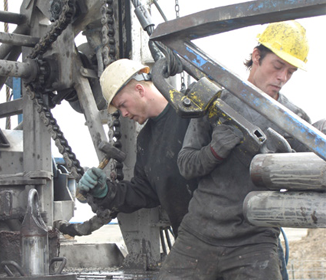The process of drilling for oil on an offshore rig requires team work from a number of different workers, each with unique skills. Requirements for these different jobs such as education and training, as well as job responsibilities and pay would also be unique to each position. Because there are so many oil rig drilling jobs, we wanted to provide a list of what these jobs are, as well as a description for a few to show people the incredible opportunities that exist on an offshore oil rig.
Job Titles
There are actually several categories of workers associated with oil rig drilling and while some might be considered entry level and others upper management, they are all critical to getting the job done. Keep in mind that for some of these oil rig drilling jobs various levels exist based on job function and skill level. For the purpose of this article, we listed only the Land Drilling Crew category and the various positions associated with it.
Land Drilling Crews: Driller, Derrickhand, Floorhand, Leasehand, Motorman, Rig Manager
Work Description
For each of the oil rig drilling jobs listed above, a brief detail of responsibilities has been provided.
- Driller – In this role, the driller would be responsible for supervising crewmembers handling some of the more challenging jobs on the rig to ensure everything meets company regulations, as well as safety rules and regulations according to OSHA. This individual has the job or verifying all machinery and equipment used and recording information gathered. Of all responsibilities, the driller’s most critical role is overseeing the safety of crewmembers but also equipment/machinery during operations.
- Derrickhand – The upper section of the drilling string is the responsibility of the derrickhand. As the string is brought down and into position to be lowered into the drill hole, this individual ensures proper alignment and safety. In addition, the derrickhand would ensure drilling fluid is in proper condition, circulation machinery is working at peak performance, and rig machinery is in appropriate condition. Other responsibilities include mixing chemicals, monitoring pump manifolds, and maintaining solid communicatio
 n between the driller and engineer.
n between the driller and engineer.
- Floorhand – Another one of the oil rig drilling jobs is the floorhand who assists with the setup and take down of the rig itself, as well as associated equipment. In addition, the floorhand would be responsible for handling, sorting, and moving pipe, cement, tools, and other drilling items needed. Another job of the floorhand during drilling would be controlling portions of the drill stem and pipe, among other things.
- Leasehand – The everyday operations of the drilling rig are the responsibility of the leasehand. Specifically, setup and take down of the rig, keeping equipment and buildings clean, loading and unloading trucks, digging ditches, and assisting when and where needed are the main functions of the leasehand.
- Motorman – Sometimes referred to as a Rig Tech Level I, this position involves a lot of physical labor. For instance, diesel and electric engines of the rig have to be operated and maintained, tools and replacement parts ordered, and testing of machinery specific to safety and operation would all be a few of the key functions of the motorman.
- Rig Manager – Virtually every aspect of rig operations would be the Rig Manager’s responsibility. This would include setting up, taking down, and moving the rig, ensuring safety of all crewmembers, monitoring operations to make sure compliance with government and environmental regulations are being followed, and that overall production is on target.
Benefits of Oil Rig Drilling Jobs
For one thing, jobs specific to drilling are available on an entry and manager level. Because these jobs are in such high demand, there is plenty of opportunity for a person willing to put in hard work and time. In fact, drilling jobs are an excellent stepping stone to bigger and better positions on an oil rig, which means more responsibility but also more money.
Another key benefit to oil rig drilling jobs is that pay is excellent. Compared to other labor intensive jobs, even an entry level position would have a starting pay somewhere around $40,000. Yes, there are dangers that go with oil rig drilling jobs but working for a reputable company and paying attention to things being taught would make this a starting position to a great career.
Here are some related articles on oil field jobs. Check it out:
- A Complete Overview of the Various Oil Field Security Jobs
- Opportunities for Oil Field Jobs Overseas

